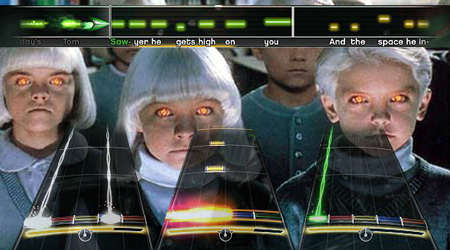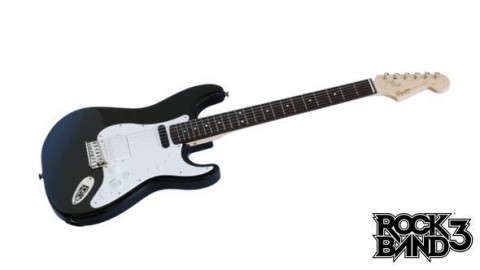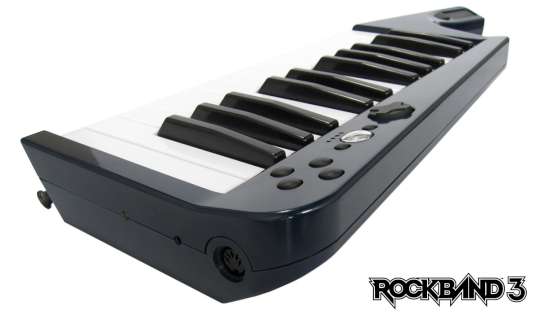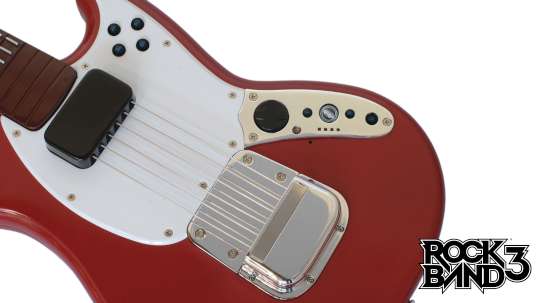Rock Band 3: Rock Out with your Natural Talent Out
Remember when Rock Band first arrived on the scene? It, along with the venerable classic Guitar Hero, proved that it is possible to get up off the couch and interact with a game in a way that no Wiimote could ever hope to deliver. And the world lost its friggin’ mind. Suddenly people who had no interest in gaming had a way to channel their inner rock star without feeling like some pimply-faced teen or the pressure to be Teh Pwnerer; it was just a fun piece of kit that anyone could pick up and learn to use in a matter of minutes, regardless of what gaming or musical skills you brought to the table. At the same time it introduced a whole new generation to a bygone era of amazing music, when men sang songs about chopping down mountains with the edge of their hand, and all those boy bands that roam the Earth weren’t even yet twinkles in their daddy’s eyes. The good ol’ days, some call it.
But Rock Band did something else, that nobody likely expected. It proved itself as a valuable tool for nurturing as-yet-untapped talent. Suddenly the implausible claims of “Hey I’ll bet you could learn to play drums on that thing” turned into incredulous exclamations of “You learned to play drums on THAT thing??”. Kids and adults alike were capitalizing on the freedom to play around in a pool that until now they’d only maybe dipped a toe into, with absolutely no fear of failure, reprisal, or waking up the neighbours.
I can think of at least 2 real-life examples of this off the top of my head…
One is a 30-year old man who is a 90% on Expert Rock Band drummer, who then took what he learned from playing the game, paired it with some natural talent, and became the drummer in an actual rock band. The other is a 12-year-old boy who had never played drums in his life until his mother got him a copy of Rock Band for the PS3, and is now consistently ranked in the top 10 on the PSN gamer boards. The kid blows through Panic Attack and gets a 98% while discussing what to have for dinner. It’s actually kinda creepy, like Village of the Damned-creepy. But it’s equally impressive, and you don’t get that good at something that imitates an instrument without getting at least a little better at the real thing, no matter what Jack White or Jimmy Page have to say about it.

It looks like Harmonix feels as I do, as the latest iteration (that’s 3 if you’re counting) has been given layers upon layers of real. The singing is still singing, and the only way to improve on that part is to spend a lot of time in the shower, but they’ve added vocal harmonizing this time around, which was first introduced in the Beatles edition of the game. Mad Catz, the official peripheral maker in the third outing, is giving all the instruments a Pro treatment. The drum kit from the older editions will still be functional, but they’ll also be adding a 3 cymbal set to add realism to the part.
Also new is the piano key peripheral which walks like a Keytar and quacks like a Keytar but is inexplicably dubbed the Wireless Keyboard Controller. The keys on the controller are velocity sensitive, like many actual MIDI keyboards on the market. Also like most MIDI keyboards, it has a MIDI port, so you can interface with your favourite sequencing software or do whatever else you want to do with a MIDI keyboard. In the game, the Keyta…um, Keyboard track does away with the familiar 5 colour blocks we all know and love and instead uses an actual keyboard graphic, so tickling the ivories in Rock Band 3 is pretty much as close as you can possibly get to the real thing.
MIDI is a two way street as well, as Mad Catz will also be bringing out a MIDI adapter that will allow both budding and seasoned musicians with real MIDI drums and keyboards to hook their gear into it, and play the game.
As serious Harmonix is about adding some new elements to the Rock Band dynamic, they’ve not forgotten the thing that made this kind of rhythm game a success in the first place: the guitar. The weak point in guitar games has always been the plastic axe, which had zero correlation to a real instrument. But no longer. The new axe, which is based on the old-skool Fender Mustang, does away with the coloured buttons and instead uses a 6-string system for the strum bar, in combination with 6 buttons along each of the 17 frets, which looks to do a pretty good job of replicating what it’s like to play a real guitar.
“But Rye”, you say, “games are games and fun is fun, but at this point, why not just play a *REAL* guitar?” Well my nit-picky friend, it’s interesting you asked that, because the guys over at Mad Katz were thinking the exact same thing. Behold, the Rock Band Squier Stratocaster.

This is the controller that really blurs the line between gaming peripheral and real instrument. This fully functional 6-string twanger has special pickups under the neck to interpret finger position while playing the game, but when you’re done, you can take the guitar and plug it into any amp you want, and play the real thing. In fact, at the end of this article, you can see that you can amp it, and play the game at the same time if you want, but that’s probably best left to solo sessions.
This is what you’ve been wanting all this time, whether you knew it or not. A Rock Band guitar that’s actually a guitar. Check the video below to see it in action; ironically, to “The Hardest Button To Button” by the White Stripes.
The accuracy of the game’s chords, finger positioning, and even key for any of the new peripherals remains to be seen, but I think it can be safely assumed that the higher you go in difficulty, the more accurate it’s likely to be. Regardless, Rock Band is able make a bold claim that few other games can; that being, that playing a video game can translate into a real-world practical skill. Not only have they stepped over the very wide line that separates entertainment from educational, they’ve also utterly disarmed the screaming masses of naysayers who make irrational statements about the value of video games based on nothing but their own personal bias. Statements like this one:
“It’s depressing to have a label come and tell you that [‘Guitar Hero’] is how kids are learning about music and experiencing music,” [Jack White] said. He added that although he doesn’t try to dictate “which format people should get their music in…if you have to be in a video game to get in front of them, that’s a little sad.”
And here I thought the fact that RB3 is a legitimate, viable way to get people to pay for your music would’ve been enough for him.





[…] This post was mentioned on Twitter by . said: […]